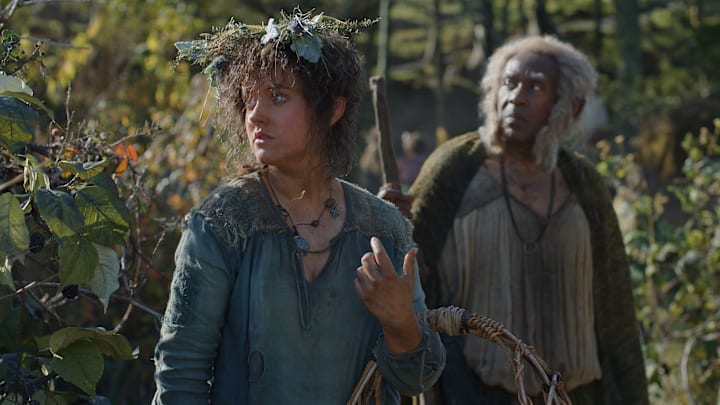Just over a week remains before the release of The Lord of the Rings: The Rings of Power on Amazon Prime Video and I know I am not the only person looking forward to seeing where the stories will go next. I spent most of the pandemic reading one chapter a week of Tolkien with someone who had never read him before and his works kept me looking for high hope in dark places.
Here are a few recommendations of things that can be read at any time of year to get you into a reading hobbit... I mean habit.
1. The Adventures of Tom Bombadil by J.R.R. Tolkien
A local secondhand bookstore used to call me every couple of months. They knew I was a hobbit at heart and would give me a heads-up if they had received any good Tolkien works. This is how I came to possess a first American edition of The Adventures of Tom Bombadil.
In The Fellowship of the Ring, the chapter dealing with the four hobbits' visit to the house of Tom Bombadil describes the stories he told them of sentient trees and peculiar behaviors of woodland creatures. This collection of poetry would fit right in with those tales. My personal favorite is about Perry the Winkle, who takes a chance on a lonely troll and discovers that he has much to learn from this massive creature. While the rest of the town wants to take advantage of the troll's kindness once they realize he isn't so bad after all, they never have the same friendship as the Winkle developed.
2. The Fall of Numenor by J.R.R. Tolkien, edited by Brian Sibley
One of my favorite things about The Rings of Power is the first on-screen depiction of Numenor. This powerful island kingdom is rich in arts and industry and there is valor to be found in its population.
If you want to know the ending now, I cannot recommend highly enough this story. It is one of heart-breaking hubris and is not a single tale, but a collection. As Tolkien Gateway explains it, "The texts were previously published in The Silmarillion,, Unfinished Tales, The History of Middle-earth, and The Nature of Middle-earth." Everything that you could want to know about the pivotal Second Age is brought together in this gorgeously-illustrated compendium with art by Alan Lee.
3. The Lord of the Rings and Philosophy: One Book to Rule Them All, Edited by Gregory Bassham and Eric Bronson
Any one of Tolkien's books can be food for thought. You don't have to get into heated discussions about Boromir and Faramir or attend a Tolkien Society seminar to go beyond the surface where The lord of the Rings is concerned.
This collection of essays inspired my own interest in writing academically about Tolkien, whether with "Tolkien's Six Keys to Happiness" by Gregory Bassham or Eric Katz' "The Rings of Tolkien and Plato: Lessons in Power, Choice and Morality." It's sub-divided into "The Ring," "The Quest for Happiness," "Good and Eil in Middle-Earth," "Time and Mortality," and "Ends and Endings." Edited by two college professors, it contains such a variety of perspectives that people of many backgrounds can find something to enjoy in it.
4. The Lord of the Rings: A Reader's Companion by Wayne G. Hammond and Christina Scull
I have been reading The Hobbit since elementary school and The Lord of the Rings since high school. No matter how many times I've read it, I still learn something new in the process. This is particularly true because of my upbringing in a different time and country than that of the author.
Hammond and Scull make the process infinitely easier with their reader's companion. If you would like an explanation of a term or a little insight on a chapter that intrigues you, you can turn to the corresponding chapter in this book. It is easy to get lost in the reader's companion because it enriches your understanding of the story's contents and themes.
5. Tolkien's Faith: A Spiritual Biography by Holly Ordway
This is one of my favorite books on the author and his work. I have read the Humphrey Carpenter biography and am a fan of shorter works on Tolkien during World War I or during his education. This approach to Tolkien connected the work and the wordsmith for me in ways I had not considered.
It is common knowledge that Tolkien was devoutly religious and he even helped C.S. Lewis come to believe in Christianity. Holy Ordway, the Cardinal Francis George Professor of Faith and Culture at the Word on Fire Institute, draws readers into the fascinating upbringing of the man behind Middle-earth, but helps them understand the philosophies that shaped his fantasies. She uses correspondence and personal accounts to bolster her observations and while the book is full of the author's faith, it is not a lecture to readers. Rather, it's a guide to better understanding.
As always, when in doubt, turn to a book and read these words of wisdom: "In a hole in the ground, there lived a hobbit."
